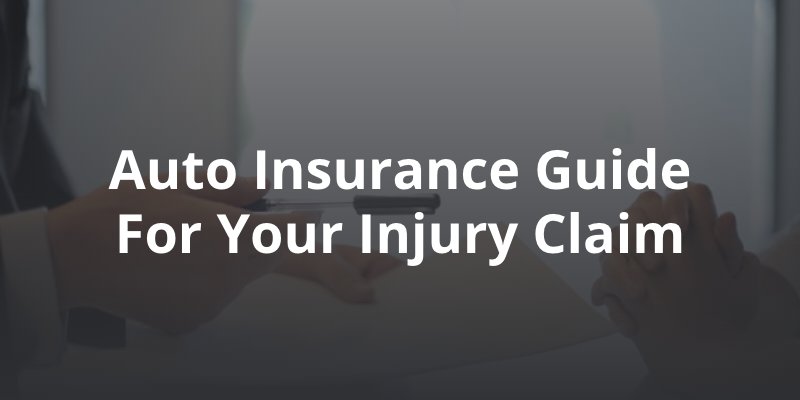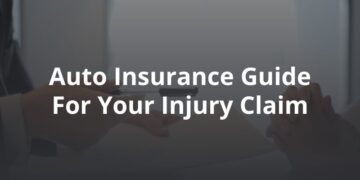
It can be difficult to know how to navigate the automobile insurance claims process after getting injured in a car accident in Texas. Handling an insurance claim while dealing with serious and painful injuries can feel overwhelming. Use this simple and straightforward guide to help you understand how car insurance works in Texas, how to file a claim and how to protect your legal rights along the way.
Texas’s Liability Laws
Texas is a “fault-based” or “tort-based” state. This means the driver or party at fault for an accident is responsible for paying for the damage caused. A victim with injuries, medical bills and property damage can file a claim against the at-fault driver to seek financial compensation for his or her losses from that driver’s policy. The victim may have to prove fault using evidence to receive an insurance settlement. In a no-fault state, by contrast, a driver will seek compensation from his or her own insurer, regardless of fault.
Types of Auto Insurance Required in Texas
In Texas, the Department of Insurance makes it mandatory for drivers to show proof that they have the ability to pay for automobile accidents that they cause. The majority of drivers fulfill this obligation by purchasing and maintaining auto liability insurance.
Bodily Injury Liability Insurance
There are two types of liability insurance required in Texas. The first is bodily injury insurance. This will pay for the other driver’s (and his or her passenger’s) medical bills if the policyholder causes an accident. This can include present as well as future estimated medical expenses.
The minimum required liability limit in Texas is currently $30,000 per person and $60,000 per accident in bodily injury liability coverage. This will pay for the other party’s medical bills, not the policyholder’s. If the policyholder wishes for first-party medical coverage, he or she must purchase additional types of insurance, such as Medical Payments (MedPay) coverage.
Property Damage Liability Insurance
The other required type of liability insurance for Texas drivers is property damage liability coverage. Motorists must carry at least $25,000 worth of coverage to pay for other drivers’ property damage repairs. If a motor vehicle is deemed a “total loss” by the insurance company, property damage insurance will also be used to pay the full pre-crash value of the victim’s totaled vehicle.
Optional Types of Coverage in Texas
Other types of insurance beyond bodily injury and property damage liability coverage are optional, not mandatory, in Texas. Purchasing additional coverage or increasing your limits can be smart if you wish to protect yourself financially in the event of a serious car accident.
Optional types of coverage include:
- Uninsured/underinsured motorist (UM/UIM): pays for damage to your vehicle and medical bills if your accident is caused by an uninsured or underinsured driver. It can also pay for a hit-and-run accident.
- Personal injury protection (PIP): pays for your own medical bills (and lost earnings) if you get hurt in a car accident, whether or not the crash was your fault. PIP requires your insurer to pay for your medical expenses within 30 days of receiving proof of your claim.
- MedPay: pays for you and your passenger’s medical bills after an accident, regardless of fault. May also pay for lost wages and other out-of-pocket expenses.
- Collision or comprehensive coverage: pays to repair your damaged vehicle or property, regardless of fault. Collision coverage pays for damage related to an auto accident, while comprehensive insurance pays for damage caused by vandalism or acts of God.
- Rental car reimbursement: pays for you to rent a temporary vehicle while yours is undergoing repairs at the shop or if your car gets stolen.
- Additional liability coverage: you can increase your coverage beyond Texas’s minimum liability limits to protect yourself from having to pay out of pocket for a car accident that causes serious injuries and losses, such as a multi-vehicle crash.
A major crash can easily exceed the limits on a standard policy, making you personally liable for any remaining expenses. Standard insurance in Texas will also not pay you for any of your own losses if you are at fault for a crash. Purchasing optional add-ons can ensure adequate coverage and greater peace of mind.
How to File an Auto Insurance Claim
If you get injured in a car accident in Texas, contact your own car insurance company without delay to report the collision. Do not admit fault. Then, contact the other driver’s car insurance company to file a claim.
When speaking to an insurance claims adjuster, do not speculate about fault and do not rush to accept a fast settlement. Be sure to get medical care, collect copies of your medical bills and take photographs of your crash scene before beginning the insurance claims process.
Auto Insurance FAQs
Am I covered if I was driving someone else’s car?
Yes. Automobile insurance is attached to the vehicle, not the driver. As long as you had the vehicle owner’s permission to drive the car at the time of the crash, the owner’s insurance company will provide coverage for your losses. There may be exceptions for people who share the policyowner’s household, however.
Am I covered if I was a passenger?
Yes. Passengers who are injured in car accidents can typically receive financial compensation from the insurance policy of the at-fault driver as well as the driver of the vehicle the passenger was riding in. The “per accident” bodily injury insurance coverage that is required in Texas covers injuries to passengers.
What if the other driver doesn’t have insurance?
If a driver in Texas crashes into you but does not have insurance, you may be able to seek coverage from your own car insurance provider. However, you will need to have purchased an optional type of first-party coverage – such as PIP or collision insurance – for your losses to be covered. A claim or lawsuit against a third party may also be possible, depending on the circumstances.
When to Contact a Car Accident Lawyer in Texas
Even if you have the correct type of coverage and did not cause the car accident, you may struggle to recover fair financial compensation from an insurance provider in Texas. This is why you should contact a car accident attorney near you for legal advice and assistance. An attorney can guide you through every step of the insurance claims process or file a lawsuit on your behalf, if necessary, to resolve your case.





